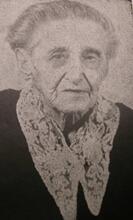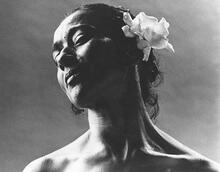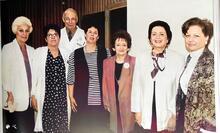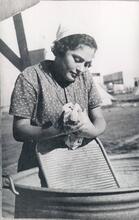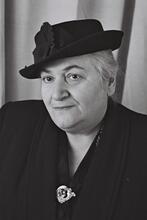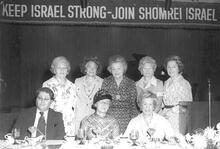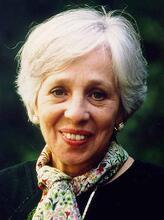Juliette Pary
Swiss identity card of translator, journalist, and author Juliette Pary (pen name of Juliette [Gourfinkel] Pougatch), 1944. Courtesy of Swiss Federal Archives E4264#1985/196#10835*, ref. N07255, ICHENHAUSER, LILLY, 31.10.1922; POUGATCH, ISAAC, 23.03.1897; POUGATCH-GOURFINKEL, JULIETTE, 06.08.1903, 1943-1946.
Born in Odessa, Juliette Pary moved to Paris in 1925 and became a respected translator, journalist, and author. Her first translations were of Agatha Christie’s novels, just beginning to gain fame on the Continent. Pary became a reporter for magazines and newspapers associated with the leftwing Popular Front, focusing especially on issues relating to childhood and youth. She became more closely engaged with children when she became the director of a camp outside Paris for children from the urban, working-class neighborhood of Belleville. During World War II, Pary and her husband worked with refugee children in the French Free Zone before fleeing to Switzerland in 1942. After the war, Pary spent several months in Israel providing eyewitness accounts of battles against the Egyptian army. She died in Switzerland in 1950.
Juliette Pary (born Gourfinkel) was a writer known in a variety of French milieux. Well regarded as a translator, she was also a major journalist who documented the Popular Front and whose work embodied the rapidly developing field of reporting. She also played important roles in the history of summer camps, youth hostels, and modern educational practices. Although not observant, she was an involved and engaged Jew who witnessed not only violence and war but also the birth of the state of Israel.
Early Life & Family
Julia Gourfinkel was born on August 6, 1903, into an educated Jewish community in Odessa. Her mother, from a Hasidic family, studied literature and was one of the first women academics in Russia. Her father was a pediatrician who practiced in St. Petersburg before moving to Odessa; he was part of the generation who promoted Jewish assimilation while participating actively in Jewish educational associations and organizations assisting the victims of pogroms.
In this environment, Julia Gourfinkel was exposed to literature and a variety of languages. In addition to Russian, she studied Yiddish, French, German, Italian, and English. Her family was gradually impoverished by the civil war that followed the Russian Revolution of 1917. Juliette began her studies in St. Petersburg but moved to Paris in 1925, following her sister, the writer and translator Nina Gourfinkel.
Translation & Reporting
In Paris Juliette decided to earn her living as a writer. She first worked as a typist in order to make ends meet but soon became a translator, taking the name of Juliette Pary, in an homage to her adopted home. She began by translating the novels of Agatha Christie, who the late 1920s was beginning to gain fame on the continent.
Between 1928 and 1930 Pary wrote for the newly created Ambassades et Consulats (Embassies and Consulates), a paper that reported on French diplomacy; there she published interviews with diplomats and their wives, as well as investigative reports on social issues. She went on to publish translations from German: Herman Hesse’s Les loups des steppes (Steppenwolf) and Stefan Zweig’s Freud: La Guérison par l’esprit (Freud: Healing through spirituality).
Pary also frequented Parisian Jewish intellectual circles. There she met Isaac Pougatch, a stateless Jew from the Ukraine who had come to France via Geneva and worked in an art gallery, and they married in 1931. After the Nazis’ rise to power, Pary and Pougatch quickly became active in efforts to assist Jewish refugees fleeing Germany. They worked through the Zionist youth organization Agriculture et artisanat (Agriculture and Crafts), founded by Justin Godard and Andre Spire, a major figure in the “Jewish revival” movement of the interwar period. They also regularly collaborated on contributions to the weekly Journal Juif (Jewish Journal). But Pary had not given up her literary ambitions and she published two psychological novels and a young adult novel between 1933 and 1935.
In the 1930s, Pary became a reporter for magazines and newspapers associated with the leftwing Popular Front. She wrote regularly on current events for the weekly Marianne, focusing especially on issues relating to childhood and youth. She also wrote for the communist magazine Regards, doing major reporting on subjects such as threats to childhood, leisure activities, women, and Judaism. In 1938 she reported on the international women’s conference on peace and democracy, in which she was invited to participate as a Jewish delegate, along with a Catholic and a Protestant. Pary also contributed to the leftist weekly Vendredi (Friday), as well as the monthly Cahiers de la jeunesse (Youth Journal), edited by Paul Nizan.
Work with Youth
In addition her literary work, Pary also became involved in education when she accepted a three-month post supervising Jewish children from the working-class Belleville neighborhood in a chateau outside Paris, where they could be exposed to the physically and morally healthy environment of a summer camp. As the camp director, she welcomed a group of 42 boys, followed by a group of girls and another group of boys. She described these experiences in an article for Marianne in November 1935 and several years later in a work entitled Mes 126 gosses (My 126 Kids), in which she wrote eloquently about these urban children’s summer camp experience.
Her work with the camp helped to make Pary a specialist on youth, a population then high on the agenda of the Popular Front government. She continued to link activism and reporting in her work on the Chorale Popular de Paris (The Paris People’s Choir), the Auberges de jeunesse (youth hostels), and Camping et Culture (Camping and Culture), as well as training camp counselors. She also wrote for the illustrated weekly Confidences and continued to translate. With her husband, she translated Sholem Asch’s Le juif aux psaumes (The Psalm Jew) from the Yiddish and Anton Makarenko’s Le Chemin de la vie (The Road of Life) from the Russian.
Wartime Youth Work
The advance of the German army in 1940 forced Pary and her husband to flee to Moissac in the free zone of France. They worked first as counselors in a home for children and then directed a rural youth camp under the sponsorship of the Éclaireurs Israelites (Jewish scouts) and OSE (Oeuvre de secours aux enfants, or Organization for aid to children). This farm-school aimed to transform fifteen young Jewish refugees into ideal pioneers, through manual and agricultural work and religious, cultural, and political Zionism.
At the end of 1942, Pary and Pougatch were forced to flee France for Switzerland. Pary’s reputation in Swiss pedagogical circles led to her liberation from an internment camp in order to focus on the education of child refugees, first as a teacher in a children’s home and then in an international program for training camp counselors. From then on she lived apart from Isaac Pougatch, as the couple no longer shared the same goals; they officially divorced in December 1949.
Post-War Experiences
Pary returned to France in August 1944, to assist her sister, who was seriously ill. Soon after her return, she was recruited to work as a liaison officer for the Ministry of Prisoners, Deportees, and Refugees, particularly in Marseille, where she greeted boats arriving from Odessa carrying refugees and deportees liberated from the Soviet zone in Germany.
In 1946, Pary published a collection of poems in German, An die Deutschen (On Germans), under the pseudonym Julia Renner. In 1948 she published L’amour des camarades (The Love of Comrades), recounting the story of summer camps and youth colonies in the interwar period. She then spent several months in the new established state of Israel, sent by the recently re-established newspaper Droit et liberté (Law and freedom). There she provided eyewitness accounts of the battle for the Negba Kibbutz, founded in 1939 and engaged in some of the fiercest battles against the Egyptian army.
Following her stay in Israel, Pary divided her time between France and Switzerland. In 1950, she published Images du jeune Israël (Images of a young Israel) in Switzerland. She also gave many talks about Israel and the French Resistance to leftwing groups in Switzerland.
Ill following her return from Israel, Juliette Pary died in Vevey on October 1, 1950.
Selected Works by Juliette Pary
L'Homme aux romans policiers. Paris: Librairie des Champs-Élysées, 1933.
Les hommes sont pressés. Paris: Gallimard, 1934.
Le Mystère de l'Opéra Building. Paris: Librairie des Champs-Élysées, 1934.
Mes 126 gosses. Paris: Flammarion, 1938.
(under the pseudonym of Julia Renner), An die Deutschen. Paris: Réalités, 1946.
L'amour des camarades. Paris: Victor Michon, 1948.
Images du jeune Israël. Lausanne: La Concorde, 1950.
Boussion, Samuel, Gardet, Mathias, Ruchat, Martine (eds). L’internationale des républiques d’enfants (1944-1954): www.https://repenf.hypotheses.org/
Downs, Laura Lee. Childhood in the Promised Land: Working-Class Movements and the Colonies de Vacances in France, 1880–1960. Durham, NC: Duke University Press, 2002.
Gourfinkel, Nina. Aux prises avec mon temps, t. 1 et 2. Paris: Seuil, 1953.
Heller-Goldenberg, Lucette. Histoire des auberges de jeunesse en France des origines à la Libération. Marseille: Centre de la Méditerranée moderne et contemporaine, 1985.
Palluau, Nicolas. La fabrique des pédagogues. Encadrer les colonies de vacances. 1919-1939. Rennes: Presses universitaires de Rennes, 2013.
Porret, Eugène. Hôtes d'un presbytère. Neuchâtel: Delachaux-Niestlé, 1953.
Pougatsch, Isaac. Charry, vie d’une communauté de jeunesse. Neuchâtel: La Baconnière, 1945.
Pougatsch, Isaac. À l'écoute de son peuple: un éducateur raconte. Neuchâtel: La Baconnière, 1980.
Spire, André. Souvenirs à bâtons rompus. Paris: Albin Michel, 1962.

![Swiss identity card of translator, journalist, and author Juliette Pary (pen name of Juliette [Gourfinkel] Pougatch), 1944.](/sites/default/files/styles/scale_width_300px/public/mediaobjects/ch-bar_e4264_1985-196_10835_5_1.jpg?itok=gVLk8IeI)
